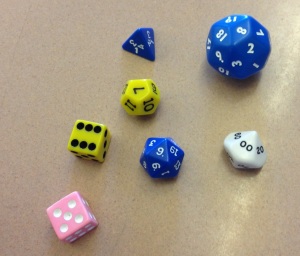This post relates to #MTBoS assignment four. For this mission I decided to listen to one of the Global Math Department‘s webinars. I came across GMD about a year ago and look back occasionally at the webinars that I miss. While reviewing I found the math games webinar back in January of last year, so that’s the one I picked for this mission. Plus, I’ve always enjoyed using math games (1,2,3) to review and believe that I can always improve in this area of my practice.
Math games have always been a part of my own teaching practice, but I want to learn how to use them more effectively. I’m fortunate to have a curriculum that highlights the use of math games in/out of the classroom. I use math games with my classes approximately once per week and primarily use them during math stations. Most of the math games that I use deal with dice, cards, and/or some type of online component. For me, the reason for using the games goes back to the concept of learning and engagement. I believe engagement can be heightened with the appropriate use of a math game. Math games also allow opportunities to develop skills related to critical thinking and problem solving. Also, guided math has played a role in how I use math games in the classroom. With a push for guided math at the elementary level, students that are not immediately with an instructor need to be able to engaged in mathematical thinking, self-govern themselves, and use their time wisely. Math games at a particular math station provide an opportunity to do just that.
Understanding what makes a good math game is important. Ensuring that the students are engaged is key. Students that drift their attention in and out of the game can cause issues; especially if the teacher isn’t directly at that particular math station. As I watched the webinar, I began to see affirmation and areas where I need to start thinking more critically about how math games are used.
A few takeaways/questions from this webinar include:
- Always start with the objective
- Does the math actually interrupt the game/fun?
- Is the math action the same as the game action?
- Time limits can encourage math anxiety
- Games can be used to introduce concepts, not just for review
- Games can encourage math exploration
- Inferencing, prediction, critical thinking and logic reasoning can all be part of the game
- Rote mathematics doesn’t have to be the emphasis of game
- Math games can reinforce gamification thinking
- Keep in mind the game design process
How do you use math games in the classroom?

Hey Matt, I appreciate your summary/takeaways of the webinar and I do want to watch that one now. When I taught 6th grade math, I would practice and review coordinates on the plane by doing a battleship game: one side of the class vs the other. Students had to listen because they didn’t want to repeat the spot their teammates already fired on and waste a precious turn. Now that I teach Precalculus, I’ve adapted that and used it to learn & review polar coordinates.
I’ve also used Jeopardy and “Trash-ball” as review games, which can be applied to any subject, but I get the feeling that the Global Math presentation had some great math-specific games. One math-specific game I’ve done is Taxman, which reviews/practices factoring. Although I’ve not blogged about it, I think it’s a fairly well-known game, and you can find the rules and an explanation here:
http://goo.gl/oWJU9V
Keep up the great work!
LikeLike
Thanks for the comment. The webinar actually has some specific math game examples. Definitely check it out if you’re interested in online math games. I need to review Taxman, it looks interesting.
LikeLike
I love using games to teach and practice math. A few years ago I was teaching my classes a new game each week so that they would have choices for that “I’m done, now what?” time. I have gotten out of the habit, though and need to get back into it. Thanks for the reminder and I might just check out that GMD presentation!
LikeLike
The right math game can often reinforce skills that need strengthening. Your comment reminds me of a few strategies that I used last school year.
Long story made short, I made up a choice board for students that finish early. Students had a choice to play certain games that helped strengthen areas of mathematical need. The games were helpful and I always made sure to have some type of documentation (score sheet, online recorder, reflection sheet) to show participation.
Thanks for the comment and trip down memory lane!
LikeLike
I used to use math games when I taught pre-algebra but now I tend to focus on applications and problem based learned instead for algebra 2. That said, number games remind me that we could do a better job incorporating number theory into curriculum rather than leaving it to the realm of math teams and clubs.
LikeLike
I can understanding the reasoning for focusing in on application and problem based learning in the classroom. Those skills and opportunities are definitely worthwhile. Your comment reminds of the importance of supplementing the curriculum to meet the needs of the students.
LikeLike